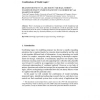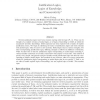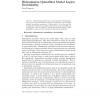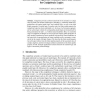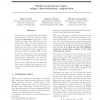AIR
2002
13 years 11 months ago
2002
There is increasing use of combinations of modal logics in both foundational and
ENTCS
2006
13 years 11 months ago
2006
We build a realizability model for linear logic using a name-passing process calculus. The construction is based on testing semantics for processes, drawing ideas from spatial and...
CORR
2008
Springer
13 years 11 months ago
2008
Springer
Modal logics are widely used in computer science. The complexity of modal satisfiability problems has been investigated since the 1970s, usually proving results on a case-by-case b...
AMAI
2008
Springer
13 years 11 months ago
2008
Springer
Several justification logics have been created, starting with the logic LP, [1]. These can be thought of as explicit versions of modal logics, or of logics of knowledge or belief,...
IJCAI
1997
14 years 23 days ago
1997
In the paper, we consider the problem of supporting automated reasoning in a large class of knowledge representation formalisms, including terminological and epistemic logics, who...
AIML
2006
14 years 25 days ago
2006
Bisimulation quantifiers are a natural extension of modal logics. They preserve the bisimulation invariance of modal logic, while allowing monadic second-order expressivity. Unfort...
AIML
2004
14 years 25 days ago
2004
The family of normal propositional modal logic systems are given a highly systematic organisation by their model theory. This model theory is generally given using Kripkean frame s...
FOSSACS
2008
Springer
14 years 1 months ago
2008
Springer
Coalgebras provide a uniform framework for the semantics of a large class of (mostly non-normal) modal logics, including e.g. monotone modal logic, probabilistic and graded modal l...
AAAI
2007
14 years 1 months ago
2007
Agents’ pro attitudes such as goals, intentions, desires, wishes, and judgements of satisfactoriness play an important role in how agents act rationally. To provide a natural an...
KR
1991
Springer
14 years 3 months ago
1991
Springer
In the paper, we investigate the way in which nonmonotonic modal logics depend on their underlying monotonic modal logics. Most notably, we study when different monotonic modal l...
